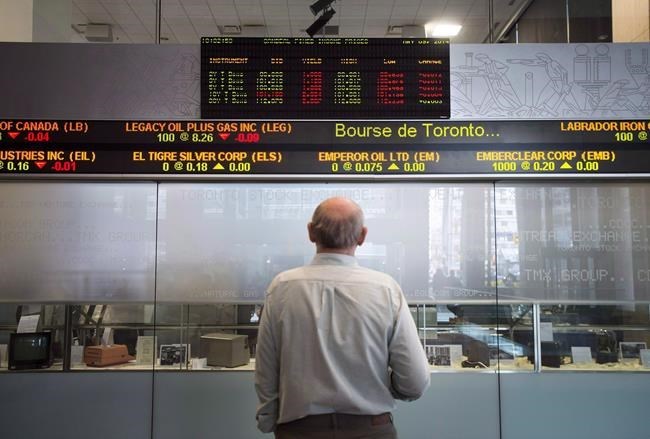North American equity markets saw weak performances on Tuesday, as strength in the U.S. dollar and bond yields placed downward pressure on energy and gold prices.
Michael Greenberg, senior vice-president and portfolio manager of Franklin Templeton Investment Solutions, said financial stocks were able to benefit from the strength in U.S. bond yields, as the 10-year benchmark rose to 1.373 per cent.
"A lot of stuff is being driven today by what bond yields are doing," said Greenberg.
"It's driving the U.S. dollar a little bit stronger, and that correlates with energy, so you've got energy down a little bit and the Canadian dollar down a little bit ... and things like financials outperforming."
The S&P/TSX composite index was down 14.80 points at 20,806.63.
In New York, the Dow Jones industrial average was down 269.09 points at 35,100.00. The S&P 500 index was down 15.40 points at 4,520.03, while the Nasdaq composite was up 10.81 points at 15,374.33.
The Canadian dollar was weaker against the greenback Tuesday, with the loonie trading for 79.23 cents US compared with 79.88 cents US on Friday.
The result was some weakness in commodity prices, with the December gold contract down US$35.20 at US$1,798.50 an ounce and the December copper contract down five cents at US$4.28 a pound.
Oil and gas prices also took a slight hit, but Greenberg said the current environment where economies are slowly reopening has kept oil prices at a relatively consistent level.
The October crude oil contract was down 94 cents at US$68.35 per barrel and the October natural gas contract was down 14 cents at US$4.57 per mmBTU.
"With COVID, it's been a bit of a two-steps-forward-one-step-back kind of environment where you get better news on vaccinations and re-openings, but as we're seeing with the Delta variant, a bit of a setback on those reopening plans," said Greenberg, who said there still is some upside left in oil.
"We would expect you could see a little bit more strength in oil as the year progresses."
Meanwhile, cryptocurrencies saw a significant sell-off on Tuesday following two months of strong performances from big names like Bitcoin and Ethereum.
Bitcoin fell from $66,000 to around $59,000 in less than a day, while Ethereum lost more than 11 per cent of its value in a 24 hour period.
Greenberg said cryptocurrencies had been rallying on news that El Salvador would use Bitcoin as legal tender, but faltered when the implementation of the country’s app for the currency had technical issues Tuesday.
"You have to remember the volatility in cryptocurrencies is extremely high," said Greenberg.
"So while it may look like a really large move from an absolute perspective, you do see this kind of volatility in cryptocurrencies from time to time."
Bitcoin had nearly doubled in value from roughly $37,000 over the previous two months before the sell-off on Tuesday.
Looking forward, Greenberg said analysts will be closely watching the Canadian election campaign as it draws to a close, with the vote less than two weeks away now.
He said Canadians can expect more spending from a Liberal majority, the status quo from a Liberal minority, and less spending if the Conservatives form government.
This report by The Canadian Press was first published Sept. 7, 2021.
Companies in this story: (TSX:GSPTSE, TSX:CADUSD=X)
Salmaan Farooqui, The Canadian Press
Note to readers: This is a corrected story. A previous version incorrectly stated the change in the S&P/TSX composite index.



